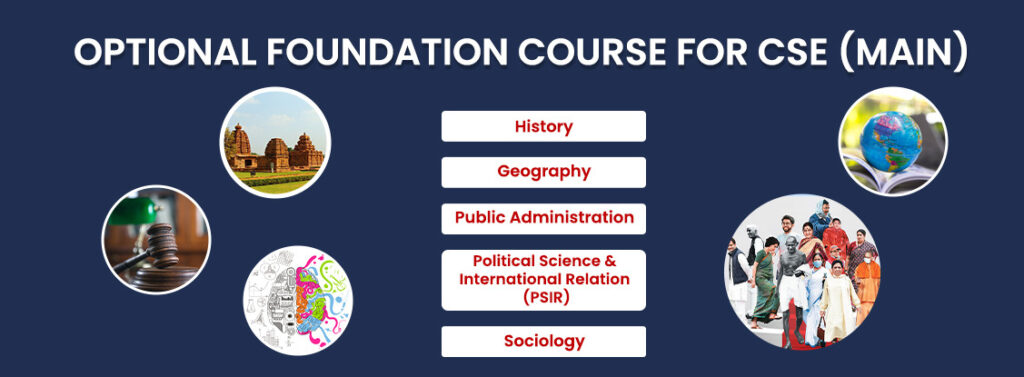OPTIONAL FOUNDATION COURSE FOR CSE (MAIN)

Optional and its Significance
What is the Criticality of the Optional Subject in UPSC CSE?
The Optional is the only type of subject that aspirants get to choose in Civil Services Exam (CSE) and whose marks are considered in merit calculation. All the remaining papers are either the same for everyone or are only qualifying in nature.
Optional subject exam is the key to success in the UPSC CSE. In GS Mains exam, you may not be able to make much of a difference but in Optional, you can even have a lead of 20-50 marks if the choice is good and the efforts have been put in the right direction.
What Offers More - Optional or GS?
The act of choosing the right optional is quite significant in the UPSC CSE. It is so because the scope of achieving higher marks is more in optional than General Studies (GS) Mains exam or any other category:
Although the weightage of the GS Mains exam is 1000 marks, taking average of two-three years, the marks of a GS Mains topper range from 475-525 out of 1000, which is only 50% of the total marks of GS Mains.
However, in case of the toppers of optional subjects, the scores range from 350-370 out of 500 which is more than 70% marks.
So, even if the weightage of optional subject exam is less than the GS Mains, the possibility of scoring higher marks is much better in the optional exam as compared to GS Mains exam.
What about the Potential of Different Optional Subjects?
The potential of an optional subject in itself creates a huge difference in the total scores of the subjects.
For instance, two students appearing for the same optional subject have a higher probability of achieving marks in the same range if their level of preparation is the same.
However, if they have two different optional subjects then the difference in their scores is quite likely to be more even in the case of the same level of preparation.
Wrong choice of optional subject play a major role in being unable to clear UPSC CSE Mains exams.
For two serious candidates, the difference in their GS Mains exam will not be more than 10-15 marks whereas in case of optional subjects, this difference generally increases to 40-60 marks.
Studying for Optional Exams
What should be the Right Strategy?
- The strategy should be made ultimately by you. One of the right approaches would be to complete the whole GS syllabus once and then choose the right optional for you.
- You can either study parallelly (multiple exams; GS, essay, Optional, at once) or by pipelining (one by one).
- Either of the two approaches is fine, provided you have completely studied your optional syllabus before appearing for UPSC Prelims.
- You should have not only covered your optional syllabus but have also practised answer writing in that subject.
Some Important Tips:
- It is better to follow a good journal from your related subject. Study subject-specific journals and good articles from authentic sources and newspapers like The Hindu and Indian Express.
- Try to quote recent reports, indices and surveys or the recommendations of a renowned committee in your answers. Quoting good sources makes the answer authentic and increases your chances of scoring higher.
- UPSC gives weightage to the authentic answers.
- While studying current affairs, do note down the recent researches, books, articles, indices, reports and the unique results/conclusions of the reports.
- Using these unique facts in essays, optional subject exams or in GS Mains exams would be really helpful.
- You should not be choosy while studying the syllabus of the Optional subject exam. Almost 90% of the syllabus of the subject has to be done.
- You may leave only one or two topics without studying properly but still having an idea of the same.
- Those who have studied selectively, are very much prone to risks in this exam.
- Preparation for the optional subjects is completed only when you have practised all the previous year questions because in the optional exam, it is very much likely that the questions get repeated.


